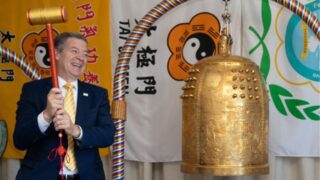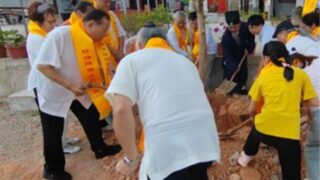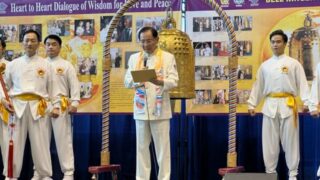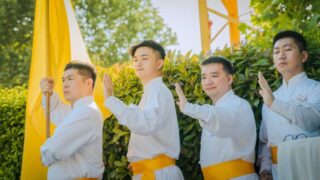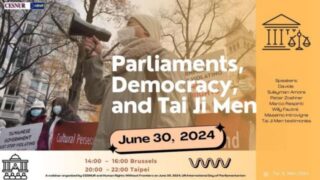Nobody is above the respect of just laws. Taiwan’s high rank in the Global Corruption Index scale is not coincidental, and is validated by the Tai Ji Men case.
by Hans Noot*
*A paper presented at the webinar “The Tai Ji Men Case and the Rule of Law,” co-organized by CESNUR and Human Rights Without Frontiers on January 11, 2022, Taiwan’s Judicial Day.


Today, as we commemorate Taiwan’s Judicial Day, we congratulate its citizens towards so much progress over the past few decades. You are not alone in the struggle for the rule of law and the consequential freedoms. And, deplorable as it is, this fight is not without the necessary sacrifices. That battle never ends. Its road is unpaved—rocky, with twists and turns.
The question is, what freedoms do we seek? Some assume that people are only free when they have the power to trade and make an honest living. Others feel a need for the right of association; others again maintain that the freedom of conscience or the freedom from persecution is paramount. Freedom of expression is a right many seek.
After all, how free are we if the state controls the media or if the media manipulate the public with false information? How about the freedom of movement? Or the freedom from the fear of foreign oppressing powers? Whatever our quest, it is a tell-tale sign of the limitations and fears we, the people, experience. It is an expression of societal trauma.
All of these freedoms I mentioned are important. After all, freedoms are good for both the individual and the nation. One questions, then is, if there were an overarching structure that could liberate a nation and set all citizens free, what would that be?
Indeed, there is such an overarching structure. But, certainly, it is not about lawlessness or corruption, or the dictates of a small group at the top. Paradoxically these protections are found in the opposite, namely “the rule of law.” Yes, you heard me right: it is laws that make a people free. However, not just any laws. Not all laws are just, and not all laws are designed to protect the individual; not all laws apply to everyone equally; and not all laws are enforced appropriately.


There is one vital prerequisite to make this system of law-and-order work. It is that laws need to be applicable to each individual and organization equally. Nobody has power over the law; there are no elites that are above the law; no one can abuse the law without penalty; no one can bribe him- or herself out of the consequences of a criminal act, or into favor with the authorities. That is the definition of the rule of law we are talking about.
No state authorities, no politician no matter how powerful, no police, no corporation, no government agency—not even the tax authority—no religious leader—no person, and no organization, can change or even bend a just law without the frowning eye of the judiciary watching and punishing.
The rule of law is enshrined in the national constitution as a sacred document. It becomes effective if it is enforced by the police, cherished by politicians, and judged by an independent judiciary with enough teeth to enforce its verdicts—a judiciary shielded from corruptive, political, or financial gain, irrespective of the perpetrator’s financial or social status, just as the law intended it. Such rule of law provides for freedom for all.
The application of the rule of law goes hand in hand with a strong anti-corruption policy. Taiwan is number 35 of the top 100 nations mentioned on the Global Corruption Index scale. But having studied the numerous acts of corruption made by the Taiwan National Taxation Bureau that were overturned time and again in courts of law, one wonders to what extent freedom and liberties are guaranteed at an acceptable level in Taiwan. Why is it that the National Taxation Bureau got away with trumped-up fraud charges, coercion, threats, confiscation of property and auctioning it off, theft, and defaming Tai Ji Men and its dizi?
After twenty-five years, this case is still a hot topic without resolution. It is even increasingly receiving global attention. The judiciary has no grip on these illegal practices. Those who have received corruptive bonuses for going after Tai Ji Men have not been brought to justice. The dizi have not seen justice and restitution after having won so many court cases. The government has not rectified the abuse of power of the National Taxation Bureau as yet. And Tai Ji Men is not the only victim of this corrupt tax system. And still, no legal tax reform has been in the cards.
If and when that happens, Taiwan will rapidly ascend to a better rank in the Global Corruption Index scale, and towards the desired freedoms and protection of individual and organizational rights.
Nations consist of humans—valuable humans. They need to be equally protected by independent and powerful courts. Any nation that assumes that the rights of these humans are subject to the needs of the nation, may, one day, find that there are no more humans left to rule over. The rule of law for each individual and organization equally remains the core of any governments’ mandate. We wish Taiwan to succeed on that road to freedom and liberty.


